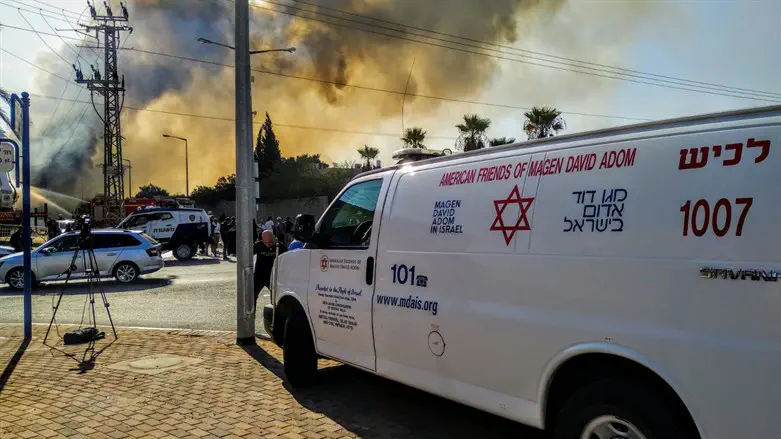
In the latest chapter of the ongoing dispute between MDA and other emergency responder organizations, primarily United Hatzalah, MDA claims that it is amenable to expanding the number of EMTs who are summoned in an emergency by its dispatch system – and blames the Health Ministry for not having expanded the list of authorized EMTs to date.
According to MDA, most Israeli EMTs are affiliated with MDA and it is MDA’s dispatch system that is activated when someone dials 101. However, according to the current protocol, the Health Ministry is the body that decides which additional EMTs can download MDA’s first-responder app, and only those given permission are alerted to emergencies.
So far, around 3,400 EMTs from United Hatzalah have the app, leaving around 3,000 without. In addition, United Hatzalah has frequently alleged that MDA deliberately refrains from dispatching even its approved volunteers to emergencies when in many cases, they were closer to the scene and could have provided life-saving care within a critical window of opportunity that was lost due to MDA’s slower response times. MDA has rebuffed the accusations.
“We’ve had observers from the Health Ministry stationed with us previously and they confirmed that MDA is dispatching the 10 nearest first responders to medical emergencies regardless of whether they volunteer or work for MDA or any other authorized Israeli EMS organization,” said Dr. Eli Jaffe, Magen David Adom’s deputy director-general for training, community outreach, and volunteers.
“If a United Hatzalah volunteer isn’t dispatched to an emergency by MDA, it’s only because they aren’t authorized to have the first responder app by the Health Ministry or because there are 10 first responders nearer to the scene,” he added. “The dispatch system makes no distinction between an MDA or United Hatzalah first responder.”
On Sunday, MDA announced that it was willing to increase the number of EMTs it dispatches to emergencies – if the Health Ministry approves the decision and provides MDA with their names.
“If the Health Ministry tells us they want us to provide all EMTs access, regardless of whether they’ve been previously vetted by the Ministry, we’ll do that,” Jaffe said. “But that decision needs to come from the Health Ministry. We don’t have the authority to make that decision unilaterally.”
He cautioned, however, that any attempt to settle the dispute by giving the Health Ministry control over the dispatch system would be a mistake.
“MDA’s dispatching operations are the result of years of developing technological innovations that have been both labor and cost intensive, and have been tested and proven effective,” Jaffe said. “The result is a system developed by MDA in-house, that plays a crucial role in the chain of survival for seriously ill or injured patients. The notion that any other entity could replace that with a system with comparable capabilities is not only unrealistic, but also entirely unnecessary.”
The system developed by MDA uses artificial intelligence to simultaneously dispatch the closest first responders and ambulances to the scene of a medical emergency. It also uses caller geolocation technology and live video streams to enable MDA to make better-informed decisions about dispatching resources to a medical emergency, features not currently used even in other advanced countries. As a result, MDA’s system was adopted by the Philippine Red Cross, which operates that country’s EMS system, as well as by the Israel Fire and Rescue Service.
“When we’ve shown our dispatch system to American EMS and emergency response officials, they’ve been blown away by the system’s technological innovations,” said Ido Rosenblat, MDA’s chief information officer, whose staff oversees the technological developments of the system. “It would be incredibly counterproductive to abandon this system or hand it off to a governmental department that’s never been in a dispatching or technological innovations role, which could only delay to responses to emergencies.”
Rosenblat added that he does not accept some of the allegations made by United Hatzalah, accusing MDA of failing to summon their members to emergencies even when they were close by.
“The simple fact is that if an EMT has our first responder app, they’re dispatched if they’re near the scene — regardless of what organization they work for,” Rosenblat said. “If they don’t have the app, it’s because the Ministry of Health hasn’t approved them to have the app under the current protocols.
“In some of the cases cited at the [Health Committee] hearings, our dispatch system conclusively showed United Hatzalah first responders had been dispatched to the events and that, in most cases, United Hatzalah EMTs actually responded,” he added. “In fact, we showed those metrics to the Health Committee chair, conclusively refuting United Hatzalah’s allegations. Yet, at later Health Committee meetings, those incidents were referred to again despite that we previously proved that the details cited by United Hatzalah were inaccurate and unquestionably false.”
“People are entitled to their own opinion,” said Jaffe, “and if the Health Committee and the Ministry of Health believe opening up the first responders list to people currently not approved by the Ministry, we’re onboard with that idea.
“However, people aren’t entitled to their own facts,” he added. “The computerized records from our dispatch system show conclusively that we’ve always dispatched the nearest first responders — whether they’re affiliated with MDA, with United Hatzalah, or with the more than a dozen other independent Hatzalah organizations in Israel.”
